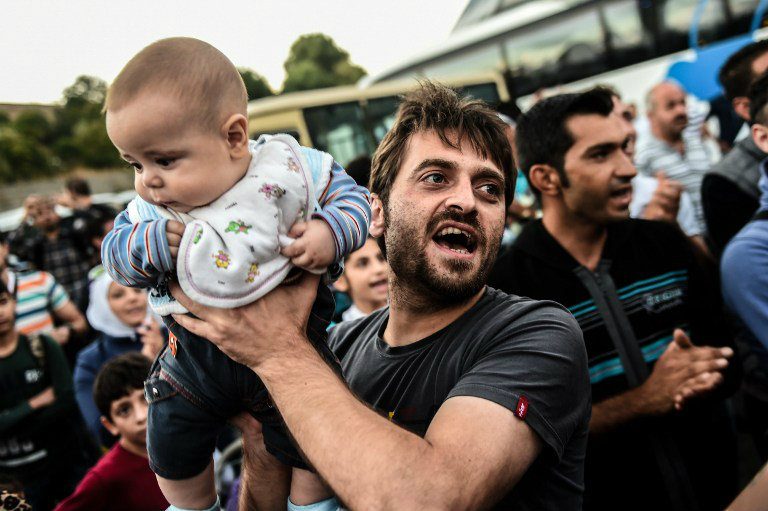SUMMARY
This is AI generated summarization, which may have errors. For context, always refer to the full article.

MANILA, Philippines – Citing Filipinos as its priority, Malacañang said that the Philippines must first assess its ability to accept Syrian refugees before making any commitment to the United Nations.
Palace Communications Secretary Herminio Coloma Jr reiterated that the government’s resources are focused on rehabilitation efforts following a spate of disasters including Super Typhoon Yolanda (Haiyan).
The secretary was responding to the call of the head of the UN refugee agency in the Philippines to admit Syrian refugees, who are torn between enduring a bloody civil war in their country or risking drowning to reach Europe.
Coloma said that the Philippines will adhere to its international commitments to protect refugees. Yet the secretary did not give a categorical answer on whether or not Manila will admit those from Syria.
“Nagpahayag mismo si Pangulong Aquino at sinabi niya na kinakailangang tiyakin natin na sapat ang ginagawa nating pagtulong sa ating mga kababayan mismo dahil sila ang ating prayoridad,” Coloma said over state-run radio DZRB on Sunday, September 20.
(President Aquino himself said that we need to ensure that what we are doing for our fellow Filipinos is enough because they are our priority.)
The secretary added: “Wala namang kuwestiyon na gusto nating tumalima doon sa commitment natin. Kaya lang, bago tayo gumawa ng kahit anong pahiwatig o commitment, ay kinakailangan din namang suriin ang ating sitwasyon.”
(There is no question that we want to adhere to our commitment. It’s just that before we make any statement or commitment, we need to assess our situation.)
Coloma said that the assessment of the Philippines’ resources will be the basis of discussions with the UN and other organizations.
In an interview with Rappler, the United Nations High Commissioner for Refugees’ (UNHCR) representative to the Philippines called on President Benigno Aquino III to accept Syrian refugees, citing the urgency of the humanitarian crisis.
Bernard Kerblat renewed his agency’s standing invitation for the Philippines to offer temporary protection, admission or to grant refugee status to a “symbolic number” of 150 or 500 Syrian refugees.
A country of 100 million, the Philippines has a storied tradition of welcoming refugees.
There are 4 million Syrian refugees desperate to find safety, food, shelter and work in neighboring countries or in Europe as the 4-year-old Syrian civil war deteriorates. Innocent civilians suffer from the war, at times the target of chemical weapons and barrel bombs. (READ: 4 years on, Syria’s civil war eclipsed by ISIS terror)
In his response, Coloma reiterated previous statements of Aquino and the Philippine Department of Foreign Affairs (DFA) on the issue.
“Marapat ding suriin at timbangin ang kakayahan at resources ng bansa na kumupkop ng mga refugee mula sa ibang bansa sa harap ng ating patuloy na pagbabagong-tatag at rehabilitasyon bunsod ng mga kalamidad, katulad ng Bagyong Yolanda, ng lindol sa Bohol at ng Zamboanga City siege,” the secretary said.
(We must assess and weigh the ability and resources of our country to admit refugees from other nations as we continue to recover and rehabilitate from calamities like Typhoon Yolanda, the Bohol earthquake, and the Zamboanga siege.)
Coloma was referring to a series of disasters that hit the Philippines in 2013.
Yolanda was the world’s most powerful storm to hit land, killing 6,000 and leaving thousands homeless in the Visayas.
Moro rebels’ siege of Zamboanga killed 19 government forces and 208 rebels, and displaced 24,000 families. The Bohol earthquake also killed over 200 Filipinos, and damaged infrastructure.
‘We welcomed Vietnamese refugees’
The Philippines acceded to the 1951 Refugee Convention, which defines who is a refugee, their rights, and the legal obligations of states. It also enacted the 1940 Immigration Act authorizing the president to accept refugees, and to set conditions for their admission. (READ:TIMELINE: Philippine laws and policies on refugees)
Yet Kerblat said that the UNHCR has yet to receive a response from the Aquino government on its invitation to admit Syrian refugees two years since discussions first began.
On Sunday, Coloma merely quoted Aquino’s statements in an interview with the Philippine Daily Inquirer last September 8 on the Philippines’ previous efforts to welcome refugees.
“[Sinabi ng Pangulo na] kung magbabalik-tanaw ay napatunayan natin ang ating pagtalima sa ating mga UN commitment sa punto ng mga Vietnamese refugee, na nasimulan nating tanggapin dito bilang transition or transient point po ang ating bansa at reception area, sapagkat ang mga Vietnamese refugee naman eventually po sila ay tinanggap ng ibang bansa.”
(The President said that if we look back in history, we proved that we adhere to our commitments to the UN when we accepted Vietnamese refugees, and our country acted as a transient point and reception area because the Vietnamese refugees were eventually resettled in other nations.)
Along with other Southeast Asian nations, the Philippines acted as a “country of first asylum” for Vietnamese refugees during the Vietnam War in the 1970s. In 1996, it also had an Indochinese refugee program, where it established a Vietnamese refugee settlement in Palawan.
The Philippines played host to refugees in 9 different occasions.
This time around, Aquino has said that the Philippines wants to ensure that it does not “take on more than what we can handle.”
The UNHCR’s Kerblat assured the Philippines that his agency and the international community will assist the government if it decides to accept Syrian refugees.
He said: “The Philippines is much better off today economically speaking, in terms of governance, in terms of stability of its institutions. What we are seeing now is the fruits of a line taken by this administration, the daang matuwid (straight path).”
“Does the daang matuwid stop within the borders of the Philippines? Or can it be extended also in offering solutions to people who are victims of persecution outside of this country?” – Rappler.com
Add a comment
How does this make you feel?
There are no comments yet. Add your comment to start the conversation.